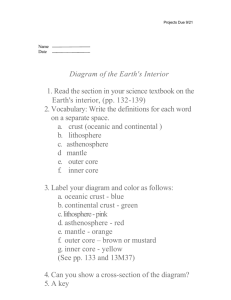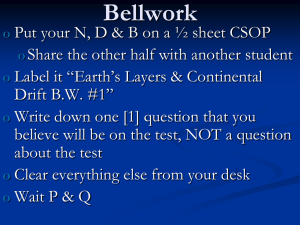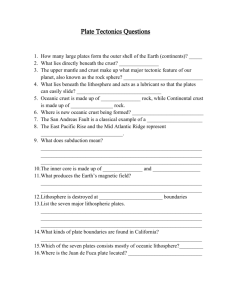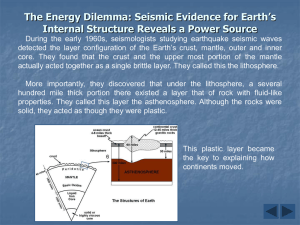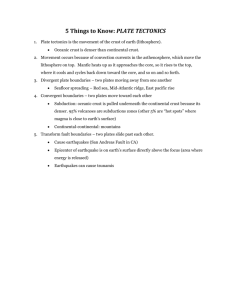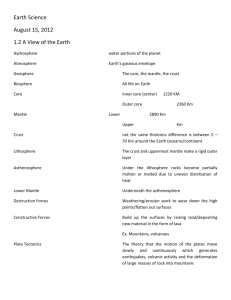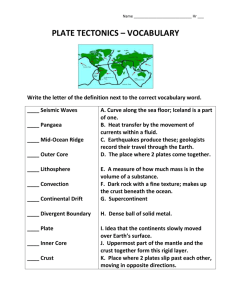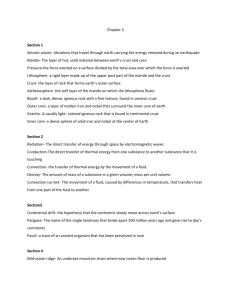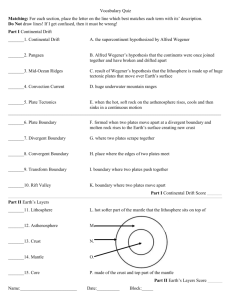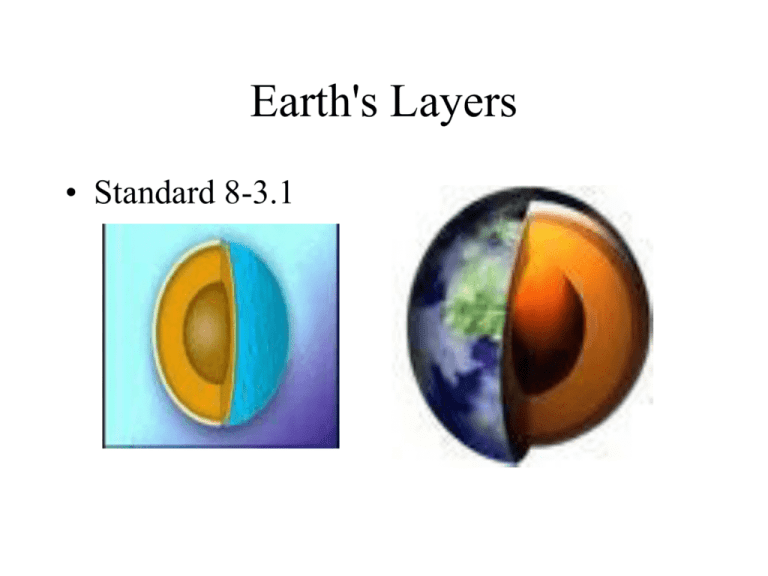
Earth's Layers
• Standard 8-3.1
Earth’s Layers
• How are the earth’s
layers similar to an
egg?
• Shell=crust
• Egg white=mantle
• Yolk=core
Earth Layers Foldable
The Structure of the Earth and
Plate Tectonics
The Layers of the Earth
© Copyright 2006. M. J. Krech. All rights reserved.
Structure of the Earth
• The Earth is made
up of 3 main
layers:
– Core
– Mantle
– Crust
Crust
Mantle
Outer core
Inner core
In which layer
is most of the
mass of the
Earth
located?
The Three Layers
The Earth is composed of three
different layers. The crust is
the layer that you live on, and
it is the most widely studied
and understood. The mantle
is much hotter and has the
ability to flow. The core
(outer core and inner
core) are even hotter with
pressures so great you would
be squeezed into a ball smaller
than a marble if you were able
to go to the center of the Earth!
The Crust
The Earth's Crust is like
the skin of an apple. It is
very thin in comparison to
the other three layers.
Outermost layer; thinnest
under the ocean, thickest
under continents; crust
& top of mantle is called
the lithosphere .
The crust is composed of two rocks. The continental
crust is mostly granite. The oceanic crust is basalt.
Basalt is much denser than the granite. Because of this
the less dense continents ride on the denser oceanic
plates.
The Crust/Density
• Least dense layer overall; Oceanic crust
(__basalt________) is more dense than
continental crust (___granite______)
The Crust
• This is where we live!
• The Earth’s crust is made of:
Continental Crust
Oceanic Crust
- thick (10-70km)
- (less dense than
oceanic crust)
- mostly old
- thin (~7 km)
- dense (sinks under
continental crust)
- young
What is one difference between
oceanic crust and continental crust?
• the continental crust is
composed of granite while the
oceanic crust is composed of
basalt.
The Crust/Composition
• Solid rock- mostly __Silicon_______ and
___Oxygen_________
• Oceanic crust-basalt;
• Continental curst-granite
• State of Matter: ___Solid___________
Lithosphere
• The layer located between the crust and
the upper mantle.
• Composed of tectonic plates or lithospheric
plates
• The plates floats on top of the
asthenosphere
• State of Matter: Solid
Asthenosphere
• The top portion of the mantle
• Known as the Upper Mantle
• The movement of the mantle
(asthenosphere) is the reason that the crustal
plates of the Earth move.
The Asthenosphere
• Asthenosphere= the fluid like portion of the
mantle that lies just below lithosphere. The
lithosphere “floats” on the asthenosphere
Asthenosphere
• State of Matter: Soft Solid
•
The Mantle
The Mantle is the largest
and thickest layer of the
Earth and is 2900 km thick.
The mantle is the middle
layer composed of very hot
dense rock that flows like
asphalt under a heavy weight.
The top portion of the
mantle is called the
asthenosphere. The movement
of the mantle (asthenosphere)
is the reason that the crustal
plates of the Earth move.
Convection Currents
The mantle "flows" because of convection currents.
Convection currents are caused by the very hot
material at the deepest part of the mantle rising, then
cooling and sinking again --repeating this cycle over
and over.
The Mantle/Composition
• Hot softened rock; contains __iron___ and
__magnesium________
• The mantle is generally considered to exist
in a solid state, although high temperatures
and pressure can cause some of this solid
rock to flow like an extremely thick liquid.
• State of Matter:
• ___solid_____________
The Core
• The core of the Earth is like a ball of very
hot metals.
• The core consists of 2 parts:
• Inner Core & Outer Core
The Outer Core
The outer
core is so hot
that the metals
in it are all in
the liquid
state.
Outer Core
• The outer core is so hot that the metals in it
are all in the liquid state. It’s the Only
Liquid Layer made up of molten metal.
This layer creates the Earth’s magnetic
field.
The Inner Core
The inner core of
the Earth has
temperatures and
pressures so great
that the metals are
squeezed together
and are not able to
move about like a
liquid, but are forced
to vibrate in place
like a solid.
Inner Core
• Heaviest material; most dense layer
• Earth’s inner core is incredibly dense,
because it is under so much pressure.
The Core/Composition
• Most of the rock in Earth’s outer core is molten,
which means that it acts like a hot liquid.
• The core is mostly made up of ___iron_________
and _____nickel___________; outer core- ___is a
slow__ flowing liquid, inner core____solid__________.
• Outer Core State of Matter: ___liquid_________
• Inner Core State of Matter: __solid____________
Earth Layers Foldable
Closure
• http://www.harcourtschool.com/activity/sci
ence_up_close/606/deploy/interface.html
•
Closure/Review
• http://www.quia.com/rr/38064.html
Layers of the
Earth
Practice Quiz Question
• Can you label the following layers?
Objective
•
•
•
•
•
•
Complete Falcon Focus
Present Essential Question
Video Clip
Class Discussion
Note-Taking
Complete Comparison Chart
Video Clip
• http://www.youtube.com/watch?v=3g5EyK
O4L0g
Plate Tectonics
What is Plate Tectonics?
• If you look at a map of the world, you may notice that some of the
continents could fit together like pieces of a puzzle.
Changes in Landform areas over
Geologic Time
• _Convection___Currents within the mantle
have broken the layer below the crust
into blocks, called plates, which slowly
move around, colliding to build mountains
or rifting/spliting apart to form new
seafloor.
•
• Continents are composed of relatively light
blocks that float high on the upper
mantle called the __Asthenosphere_____,
like gigantic, slow-moving icebergs.
• Seafloor is made of a denser rock called
____basalt______, which presses deeper
into the mantle, producing basins that can
fill with water.
• Except in the crust, the interior of the
Earth _Cannot____ be studied by drilling
holes to take samples. Instead, scientists
map the interior by watching how
___Seismic____ waves from
___Earthquakes____ are bent, reflected,
sped up, or delayed by the various layers.
Plate Tectonics
• The Earth’s crust is divided into 12 major plates
which are moved in various directions.
• This plate motion causes them to collide, pull apart,
or scrape against each other.
• Each type of interaction causes a characteristic set
of Earth structures or “tectonic” features like
mountain ranges, volcanoes and rift valleys.
• The word, tectonic, refers to the deformation of the
crust as a consequence of plate interaction.
World Plates
Lithospheric Plates or Plate
Tectonics
Plates move at very _____slow__________ rates –
from about __one_____ to _ten______
centimeters per year;
• At one time in geologic history the
_____continents_____ were __joined________
together in one large landmass that was called
___Pangaea_________________.
• The Continental Drift Theory was proposed by
Alfred Wegener in 1912.
Continental Drift
Continental Drift – states that the continents
have drifted and still are drifting apart.
“Puzzle Pieces”
• Continents look like
they could be part of a
giant jigsaw puzzle
Changes in Landform areas over Geologic Time
• As the plates continued to __move__ and split___
apart, oceans___ were formed, landmasses____
collided and split apart until the Earth’s
landmasses came to be in the positions they are
now;
• Evidence of these landmass collisions and splits
comes from fossils, landform shape, features, and
rock structures, and climate change.
• Landmass changes can occur at hot spots within
______Lithospheric____ plates;
• Earth’s landmasses_ will continue to move and
change during the geologic time of the future.
What are tectonic plates made of?
• Plates are made
of rigid
lithosphere.
The lithosphere is
made up of the
crust and the upper
part of the mantle.
Lithosphere
• The lithosphere includes the crust and part
of the upper mantle. Rock in the
lithosphere is solid, like the rock above it.
“Litho” means rock. The huge rock plates
of the lithosphere carry the world’s
continents and oceans.
Lithosphere
• As these plates move and collide, mountains
are built. Earthquakes are triggered. The
lithosphere floats on a layer of soft rock that
can flow like taffy; the asthenosphere.
Astheno means weak. The rock in the
asthenosphere flows slowly like putty or
taffy.
What lies beneath the tectonic plates?
• Below the
lithosphere
(which makes up
the tectonic
plates) is the
asthenosphere.
Motion of the Lithospheric Plates
•
Plates float on the upper part of the
____mantle_____________.
• ___Convection_____ currents can cause
the asthenosphere to flow slowly carrying
with it the plates of the lithosphere.
•
This movement of plates changes the
sizes, shapes, and positions of Earth’s
_continents____ and ___oceans_______.
Plate Movement
• “Plates” of lithosphere are moved around by the
underlying hot mantle convection cells
Boundaries
Three types of plate boundary
• Divergent
• Convergent
• Transform
Divergent Boundary
• - where two plates are moving
__apart____________
• most located along mid-ocean ridge (seafloor spreading);
• - new crust forms because __magma_____
pushes up and hardens between separating
plates.
Divergent Boundary
• the presence of mantle convection cells
causing the plates to break apart and also as
a source for new molten material.
• Where a divergent boundary forms on a
continent it is called a RIFT or
CONTINENTAL RIFT, e.g. African Rift
Valley.
• Where a divergent boundary forms under
the ocean it is called an OCEAN RIDGE.
Divergent Boundary
• In plate tectonics, a divergent boundary is a
linear feature that exists between two tectonic
plates that are moving away from each other.
• These areas can form in the middle of
continents or on the ocean floor.
• As the plates pull apart, hot molten material
can rise up this newly formed pathway to the
surface - causing volcanic activity.
Direction of Movement/Sketch
Divergent Boundary
Continental
Divergent Boundary
Oceanic
Divergent Boundaries/Sketch
• Spreading ridges
– As plates move apart new material is erupted to fill the
gap
Examples: Divergent Boundaries within the
Oceanic Crust: Mid-Atlantic Ridge
Courtesy of www.ngdc.noaa.gov
Iceland: An example of continental rifting
• Iceland has a divergent plate
boundary running through its
middle
Iceland
• Iceland is located right on top of a divergent
boundary. In fact, the island exists because of this
feature.
• As the North American plates were pulled apart
(see map) volcanic activity occurred along the
cracks.
• With many eruptions over time the island grew out
of the sea!
Example: Divergent Boundaries
within the Continental Crust:
East Africa Rift Valley
Convergent Boundaries
• There are three styles of convergent plate
boundaries
– Continent-continent collision
– Continent-oceanic crust collision
– Ocean-ocean collision
Convergent Boundary
• where two plates come ___together_____ and
__collide____.
• activity depends upon the types of crust that
meet;
• more dense oceanic plate slides under less dense
continental plate or another oceanic plate –
_subduction zone___, some crust is destroyed;
• two continental plates converge, both plates
__buckle__________ and ___push up____ into
mountain ranges;
Direction of Movement/Sketch
Continent-Continent Collision
• Forms mountains, e.g. European Alps, Himalayas
Convergent Boundary
Continental/Continental
Himalayas
Continent-Oceanic Crust Collision
• Called SUBDUCTION
Convergent Boundary
Continental/Oceanic
Subduction
• Subduction is a way of recycling the
oceanic crust. Eventually the subducting
slab sinks down into the mantle to be
recycled. It is for this reason that the
oceanic crust is much younger than the
continental crust which is not recycled.
Subduction
• Oceanic lithosphere subducts
underneath the continental
lithosphere
• Oceanic lithosphere heats and
dehydrates as it subsides
• The melt rises forming
volcanism
• E.g. The Andes Mountains,
The Cascade Mountains
Ocean-Ocean Plate Collision
• When two oceanic plates collide, one runs over the other
which causes it to sink into the mantle forming a
subduction zone.
• The subducting plate is bent downward to form a very
deep depression in the ocean floor called a trench.
• The worlds deepest parts of the ocean are found along
trenches.
– E.g. The Mariana Trench is 11 km deep!
Convergent Boundary
Oceanic/Oceanic
Transform Boundaries
• Where plates slide past each other
Above: View of the San Andreas
transform fault
Transform Boundary
• where two plates __slide____________
__past____________ each other
• crust is neither created nor destroyed;
• __Earthquakes________ occur frequently
along this type of boundary.
Example
• The San Andreas fault, adjacent to which
the US city of San Francisco is built is an
example of a transform boundary between
the Pacific plate and the North American
plate.
• Alpine Fault of New Zealand
San Andreas Fault Zone
Volcanoes and Plate Tectonics…
…what’s the connection?
Pacific Ring of Fire
Volcanism
is mostly
focused at
plate
margins
Volcanoes are formed by:
- Subduction - Rifting - Hotspots
Pacific Ring of Fire
Hotspot
volcanoes
(Hawaii)

